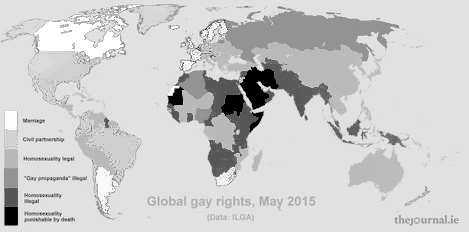Gay Rights Going Global
LGBT acceptance varies between different regions of the world. A possible reason for this disparity may be the differences in cultural values. Should different cultures accept the LGBT movement despite differences in their beliefs or values?
The LGBT movement is achieving impressive momentum around the globe. Five countries legalized same-sex marriage in the previous year alone, and three more are in process of finalizing legalization. Opposition still remain even in these countries, but such successes for the LGBT community indicate that they have won the sympathy of the mainstream.
These victories in countries such as Germany or Australia are undoubtedly commemorable, but there recently was another victory that was both similar and different. Before a Supreme Court ruling on September 6 this year, the members of the Indian LGBT community were categorized with pedophiles and rapists. Previously, Section 377 of the penal code, which forbids sexual offences “against the order of nature” such as sex with minors, rape, and bestiality, also applied to same-sex intercourse. Some countries may offer freedom and even protection to their LGBT citizens, but other countries — especially many in Africa and the Middle East — still impose extreme legal punishments, including death.
There is an apparent difference in how different countries view homosexuality, and the consequences can be dire. However, the growing global influence of Western media and ideas has meant that acceptance of LGBT lifestyles are being promoted worldwide, even to highly religious and sexually conservative countries like India. While promoting equality and protecting the persecuted are glamorous aspects to accepting foreign values, changing cultural values to conform to an international norm is highly dangerous.
Ironically, such danger can be exemplified with the same issue. The modern observer might interpret India’s decriminalization as the “freedom-championing West” correcting the outdated mindset of “conservative India”. However, that very mindset found across the world can be originally attributed to the West. India’s Section 377 was introduced under rule of the British Empire, and the numerous anti-LGBT laws in Africa were introduced under colonialism. Despite the countries having had historically neutral views on homosexuality, they absorbed homophobic values into their culture. Fast-forward some centuries later, the same countries that once preached against the sins of homosexuality are now singing tunes of sexual equality and freedom, while the victim countries still maintain the ideas that were imposed upon them.

Whether we like it or not, we are living under neocolonialism; a colonialism backed by capitalism and global influence in place of guns. Indeed, countries with anti-LGBT laws face immense international pressure. Complying to this pressure and forcing the country’s society to change and adapt is unpredictably dangerous. Depending on different cultures to determine the values for one’s own is foolish and irresponsible.
Directly or indirectly, countries that are part of the global society are unknowingly relinquishing aspects of their cultures as citizens expose themselves to the international mainstream. Cultures must preserve themselves while having the acumen to recognize what should be improved. These are the qualities that will decide which cultures win and lose in globalization.

